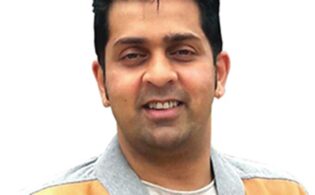We all face problems at work, but the vast majority of us do not have to worry about our physical safety as we sit in front of our computers or phones. That is not the case for media executives and their teams in Israel.
In addition to reacting to the everyday challenges of financing, production and distribution, as Nadav Palti, CEO and president of Dori Media Group, explains, in Israel, they have to be aware of how far they are from a bomb shelter.
Since October 7, when Hamas attacked Israel, Dori Media has remained open for business, although, as Palti says, many people are working from home. “We can work in the office because we have a shelter, so we have enough time to run if we hear an alarm. We have them all the time. If you are close to the border with Gaza, you have 15 seconds to run. If you are in the middle of Israel, you have 30 seconds. In our area, in Tel Aviv, it’s between 60 and 90 seconds, so we have enough time to run to the shelter. During Zoom meetings, we have to pause, take shelter and after 10 minutes, come back and resume the meeting.”
Palti and his son, Dar, a producer at Dori Media, also faced the difficult choice of whether or not to attend MIPCOM by weighing several considerations. “First, we would not let them win. They will not control what we do. We have to continue with our personal lives and professional business. Because if we do not continue, they win, and we will not let them win. It’s not only on the battlefield; it’s all around. It’s a country that should continue to function.”
The second consideration was that Dori Media is an international company, “with employees attending from around the world—from Buenos Aires, Madrid, Switzerland and Singapore,” says Palti. “They need to continue to work.” Palti and his son attended the market, while the rest of the team from Israel stayed home and continued working from there.
“A lot of people are working from home,” continues Palti. “During the pandemic, we educated ourselves and learned how to work remotely. It’s very efficient today. All postproduction, editing, even preproduction we continue to do. We have the TV channels, and they are up and running 24/7, and we have to make sure everything continues to work as usual.”
As Palti explains, his teams in Israel are not currently in production. “Right now, we don’t need to shoot. We will have to shoot in December, January and February of next year. We may need to postpone by two or three weeks, depending on the situation. We’ll make a decision at the time.”
Production is also completed in Uruguay, Argentina and Mexico, but postproduction is already underway for new episodes of shows.
“This is how we continue to function,” notes Palti. “We have enough good stuff to sell, and we cannot let them win. We don’t have a lot of choice in Israel. I don’t know if you remember, but Golda Meir told Henry Kissinger 50 years ago during the Yom Kippur War, You know, Henry, we have a secret weapon. Kissinger asked, What is the secret weapon? And Meir answered, We don’t have any other place to go. This is why we will prevail manage and win because we don’t have any choice.”
Long before the war broke out, Dori Media had been planning one of its largest programming slates. This includes several high-end scripted dramas. Amia, shot in Uruguay and Argentina, is inspired by the 1992 terror attacks on the Israeli Embassy in Buenos Aires and in 1994 against the Argentinian Jewish community.
Indal, shot in Israel, is about the kidnapping of a police officer by a group of Ethiopian Israeli youth. A local version of the romantic comedy Lalola is currently in production in Mexico for ViX. 15 a la Hora, a remake of the Israeli show Minimum Wage, has been produced by Paramount, with Dori Media selling it internationally.
There is also the dramedy Nehama, about a tech company employee who harbors dreams of becoming a stand-up comedian, when his wife dies suddenly and leaves him to juggle his ambitions and five children. Hammam, a drama inspired by the Biblical story of Saul and David, the psychological neo-noir thriller Losing Alice, and the heartwarming drama Shtisel round out the scripted slate.
The unscripted offering highlights the reality format Power Couple and the game show Best of All.
Returning to the topic of the war in Israel, which is always front of mind, Palti says he tries to compartmentalize. “I try to because we have to continue to function. You have to put everything aside and concentrate on other things,” which for Palti is running Dori Media.
“This is how we will have to fight; unfortunately, we have experience in that. We know that we have to continue with our lives, and afterward, when everything has calmed down, we will have to rebuild.”






